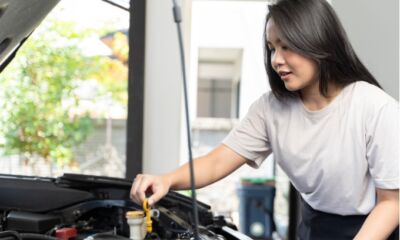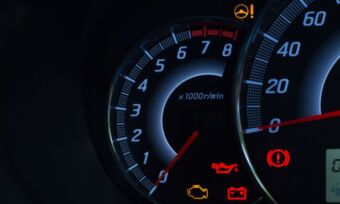How to service your own car: pros and cons
Taking care of your car with regular maintenance can help ensure it remains in tip-top condition and maximise its life on the road.

Taking care of your car with regular maintenance can help ensure it remains in tip-top condition and maximise its life on the road.
While routine trips to the mechanic may seem like an unavoidable expense, with the right tools and know-how, it’s possible to do some services on your car. Before you decide to venture under the hood, it’s important to consider the pros and cons of servicing your own car.
What car maintenance can I do myself?
There are some basic routine maintenance checks you may be able to do on your car. These could save you money and help reduce your risk of a car breakdown, according to the Royal Automobile Club of Queensland (RACQ)’s Principal Technical Researcher, Andrew Kirk. These maintenance checks include:
- Checking oil and water levels, particularly in your radiator. Knowing how to dispose of old oil is also important.
- Checking tyre pressure, condition, tread wear and depth.
- Checking all exterior lights are working and replacing any blown light globes.
- Looking for oil or coolant leak spots underneath your car.
- Checking windscreen wipers and washers are working correctly and refilling windscreen washer fluid.
- Safely testing the handbrake to ensure it ‘holds’ the car correctly on steep hills.
- Fitting a new air cleaner element (also known as an air filter) if one is required.
If you’re not particularly knowledgeable when it comes to car maintenance, it can be a good idea to ask a more experienced friend or family member to assist you initially with these tasks.
If you’re more experienced at servicing your own car, other regular service tasks can include: changing and rotating tyres, changing your oil and oil filter and replacing spark plugs and points. Investing in a service manual can also be important if you intend to service your own car.
Mr Kirk said more complex maintenance is often best left to a licensed mechanic. If you’re not confident with what you’re doing, there is a risk you could end up with a much larger bill than you would’ve had if you had taken your car to a mechanic and sought professional advice.
Checking brakes, or tampering with your car steering, suspension and safety systems should be off limits for DIYers, according to Mr Kirk, as you could end up seriously harming yourself or others, as you’re meddling with the core mechanics of the car. Fitting brake pads backwards or draining gearbox oil instead of engine oil are some examples of mistakes that can be made, says Mr Kirk. If you aren’t sure about anything at all relating to your car’s safety or maintenance, seek professional advice from a licensed car mechanic.
Pros and cons: weighing up DIY vehicle maintenance
While there may be the potential to save money and gain familiarity with your vehicle, the downside could be disastrous financially if you cause damage or get out of your depth with the repairs. You could also cause yourself or others harm if there are any safety-related issues.
There could also be insurance, legal and warranty implications. Modern cars are far more complex and require considerable specialist knowledge to work on. The right tools and equipment are needed to diagnose problems correctly. Misdiagnosis could result in unnecessary and expensive parts being ill-fitted or damaged.
Is it cheaper to do your own car maintenance?
Considering that the average car service in Australia can cost $385 for a logbook service, doing your own car maintenance may be a cheaper option. This average cost can also vary depending on the make and model of your car, the mechanic, the type of service and even your location.
However, it’s important to consider that servicing your own car takes time, energy and resources. While your labour is free, if you’re time poor it might be easier to seek professional help from a licensed mechanic. There could also be hidden problems with your car that only a professional would notice, and certain products that might need to be purchased that are easier for mechanics to source.
Another consideration is that some car manufacturers offer capped price servicing. This means that the cost of servicing at an approved mechanic is set at a fixed price for a specific length of time. This cost structure can reduce bill shock (as long as there’s no serious issues with your car) and may help you to budget ahead. If you have capped price servicing, you may prefer booking your car in with a mechanic.
What are the pros of servicing your own car?
Servicing your car yourself can be cheaper than booking it into a mechanic. Keep in mind, however, the type of maintenance your car needs can vary and whether you’ll have the time and abilities to perform this maintenance. It’s also important to consider if you can do this safely. According to Mr Kirk, basic routine checks are a great way to save money and keep your car in good working order, but consider seeking professional help from a mechanic for more complex car servicing repairs.
Flexibility
Servicing your car yourself allows you the flexibility to do the work when it suits you. This might be convenient, particularly with cars being so essential for many of us with our daily activities, whether we’re driving to work, shopping or taking children to school and weekend sports.
Better understanding of your car
Another advantage to servicing your own car is not only learning new skills, but getting to know the ins and outs of your car so that you know exactly how it should be running. Plus, if you’ve been performing basic service checks on your car regularly, then you may be able to eliminate some simpler issues if something goes wrong with your car. Car maintenance can also be an interesting and enjoyable hobby, which sometimes leads to the collecting and restoring of vintage and classic cars.
Is it worth servicing your car yourself?
If you’re considering servicing your car yourself, there are a number of potential setbacks to think about. There’s the risk of causing more damage, and self-servicing your car might lead to insurance and warranty issues.
Risk of causing more damage
While servicing your own car has the potential to save you money, Mr Kirk said the downside is the risk of your DIY maintenance going wrong. You could face financial costs if you cause damage or repair something incorrectly. There may also be safety implications if your DIY car maintenance creates issues that make your car unroadworthy without you realising it, and this could impact your car insurance.
According to Mr Kirk, modern cars are far more complex than their predecessors and require considerable specialist knowledge to work on. The right tools and equipment are needed to diagnose problems correctly, as misdiagnosis could result in unnecessary and expensive parts being ill-fitted or damaged.
Insurance and warranty issues
If you have a car warranty, this might be voided if you decide to do repairs yourself, rather than getting your car serviced by a licensed mechanic using approved parts and according to the manufacturer’s specifications. You usually have the freedom to choose who services your car under your warranty (i.e. a dealership, private mechanic etc.), but it’s important to carefully read the terms and conditions in the Product Disclosure Statement (PDS) to see what’s allowed. Authorised service centres and licensed mechanics often have access to testing equipment and specialist tools that can help them complete car repairs to the standards required.
Doing basic car servicing yourself may not have an impact on your car insurance, unless it’s deemed to have contributed to damage to your engine or to the cause of an accident. It’s a good idea to call your insurance provider before you start work to be sure what’s permitted under your policy, and also read the terms and conditions in your PDS. If you make repairs to your car that are inappropriate, or even use non-genuine parts, it could impact the resale value of your car. You may like to keep this in mind if you’re considering doing some car servicing yourself.
DIY modifications to your car, such as adjustments to the exhaust system, bodywork or wheels, may also invalidate your car insurance. Car modifications can also impact the overall cost of your insurance premiums, as well as the resale value of your car, if you’d like to sell it in the future.
Cover image source: jittawit21/Shutterstock.com
Additional reporting by Nick Whiting.
This article was reviewed by our Senior Finance Journalist Alasdair Duncan before it was updated, as part of our fact-checking process.






